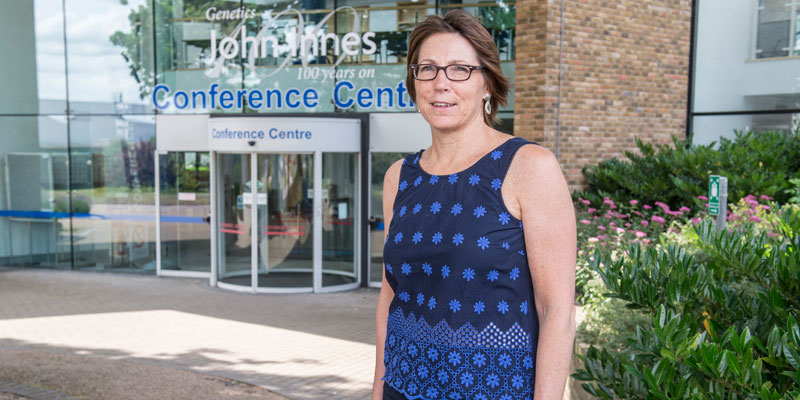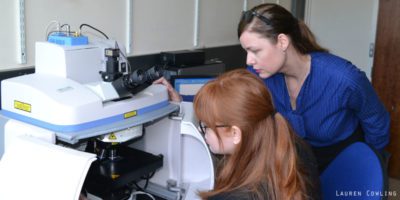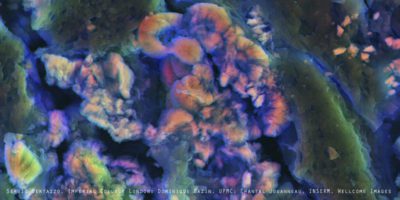Carole Thomas is Senior Equality and Diversity Champion and Chair of the Athena SWAN committee at the John Innes Centre (JIC), an independent, international centre of excellence in plant science and microbiology strategically funded by the Biotechnology and Biological Sciences Research Council (BBSRC). Carole joined JIC as a Ph.D. student in 1982 and has experience of working as a postdoctoral scientist, a research assistant and most recently in scientific admin as Head of the JIC Directorate. During her time at JIC she has taken three periods of maternity leave, and as part of a dual career family and understands the issues and difficulties that arise when trying to juggle a career and look after young children.
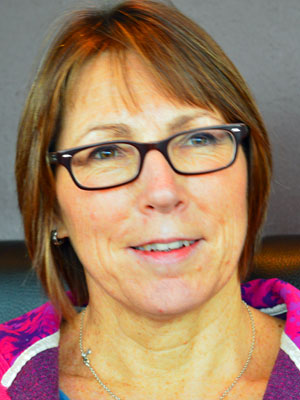
“…it is OK to be a Mother and work full time. There is no need to feel torn between work and children. My children are well-rounded independent people and if anything I would say they have benefitted from the social skills they learnt from mixing with others at a very early age. I wasted a lot of energy worrying about the impact me working would have on them…”
A career in science – aiming high and following my dreams
I was brought up in a RAF family and was constantly on the move during my school years. My mother, who I think was frustrated with her lack of career / opportunity resulting from a Forces lifestyle, encouraged my sisters and me to aim high and follow our dreams, and that anything was possible.
There were definitely no stereotypical expectations of what career a girl should do. We were brought up to be fiercely independent, and as a consequence it never occurred to me that a career trajectory in science might be different depending on your gender.
Fascinated to learn how organisms work
I have always been fascinated to learn how organisms work and I love a puzzle. The journey of scientific discovery, my natural curiosity and the thrill of learning how processes work fascinate me. There are no other scientists in my family – in fact I was the first in the family to go to university.
I obtained A-levels in Chemistry, Physics and Biology and then a degree in Biochemistry at Manchester University. I thoroughly enjoyed my practical sessions, and this made me realise I wanted a career in scientific research.
I did my Ph.D. in Plant Molecular Biology, looking at how a particular plant virus was able to spread throughout a plant during infection. My Ph.D. was partly carried out at the John Innes Centre. It was then as it is now: a stimulating place to work and probably the best place to do a Ph.D. in plant science.
First time parenthood – nothing prepares you, but it focuses your mind
After completing my Ph.D. I got married and took up a position at JIC as a postdoctoral scientist, working in another area of plant science, transposon tagging in peas. During this contract I had my first child, anybody having their first child will agree that nothing prepares you for the change in lifestyle that comes with it.
It goes without saying that having children and working on fixed term contracts, especially in science where performance is measured by the number and quality of publications, is not easy, particularly if your partner is also in the same position, as was my case. What it did do was focus my mind and taught me how to prioritise and manage my time more effectively, skills that have come in extremely useful in my current role.
Classic career sidestep but then time for me to stretch myself
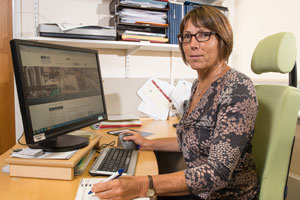
Once my family (now expanded to three children) got to an age where they were no longer dependent on me I realised that I needed something more challenging, it was time for me to stretch myself. It was at this time that a new role was created in the JIC Directorate.
The institute and the workload of the Director had grown enormously over the years and there was a need for someone with a scientific background to help keep things moving, take on Institute projects, write papers, attend meetings and all those other good things that keeps an Institute functioning. This was a high-level scientific administrative support role aligned to the Director.
My role is to ensure that the Director has the support needed to run a vibrant, inspiring and stimulating Institute and that the culture remains inclusive and that diversity is embraced. I also function at the interface of the HR department and JIC to provide a steer for what JIC needs to ensure that equal opportunities prevail.
Pluck up courage
It took me a while to pluck up the courage to make this move as I had looked at the job description and couldn’t see how I would fill all the criteria. My experience was all around working as a researcher in the lab, this new role would take me into the realms of Institute and funding politics.
Looking back it was a great career move, I have been promoted to a level that I would never have achieved if I’d stayed as a research assistant or a postdoc, and I have had the opportunity to grow the role, for instance like taking on the Athena SWAN project
Being chair of the Athena SWAN committee at JIC and why this is so important to me
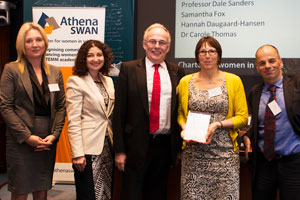
I was thrilled when we were awarded ‘Silver’ at the first attempt. We have the absolute support of our Director, Dale Sanders, and my close working relationship with him has help move things forward for our equal opportunities agenda at JIC.
The committee for this project has representation of all groups of staff across the Institute, each passionate about making sure all staff regardless of gender, role or position within the institute have the same opportunities.
I’m going to single out three people whose drive and passion have been instrumental in the success of this project: Dale Sanders, who when he started at JIC in 2010 was already pushing for us to apply for Athena SWAN status (despite the fact that at the time research institutes were not eligible to apply) The other two are research scientists Samantha Fox and Clare Stevenson, both researchers within JIC.
The need for a level playing field in science
The ‘women in science’ agenda is very important to me, I strongly believe that people should be judged on their performance and should compete on a level playing field; gender should play no role in this.
I have a daughter and want her to be able to go into the workplace and have the same opportunities as her male counterparts. I always tell her she can be anything she wants to be. I’m not for positive discrimination, but truly believe that mechanisms should be put in place that help to remove the perceived barriers to all staff progressing their careers, not just women, without the need to put their career on the backburner while they have a family.
New initiatives which benefit all staff so personal circumstances do not disadvantage individuals
The Athena SWAN project triggered a comprehensive review of current JIC good practice and in identifying areas for improvement in the ways in which we treat gender issues. It served as a focal point to accelerate our commitment to gender equality and has resulted in the implementation of new initiatives, aimed ostensibly at women, but which benefit all staff.
These include a family support fund that provides additional financial help, when needed, towards caring costs incurred while attending training courses, workshops and conferences. Another initiative enables scientists on a tenure track position (essentially a five year probation period), under compelling personal circumstances (e.g. childbirth / adoption, illness and responsibility for elderly parents), to ‘extend the clock’ by up to a year. The tenure system allows scientists to work towards a permanent post by achieving milestones within a timeframe.
JIC’s initiative ensures personal circumstances do not disadvantage individuals. Coupled with extra support for scientists on maternity leave, it is hoped that this will encourage more female scientists to apply for senior research roles.
Becoming the first research institute to receive a Silver award – excel and be the best
Anyone who knows me will tell you that I am very competitive in everything I do (despite me denying this!). I am also very proud to work for JIC, so was ecstatic that the JIC was the first Institute to receive a Silver Athena SWAN award and delighted that we followed this by an institute celebration. Our mantra at JIC is to excel and be the best, we like to lead on these types of projects and then share best practice.
It was a fantastic achievement for the Institute and confirmed our belief that JIC culture truly embraces the principles of flexibility that provide for family-friendly working practices, whilst demonstrating a commitment to career advancement for all. It is critical for JIC’s mission to be able to attract, recruit and retain the best regardless of role or gender.
This vision of excellence underpins JIC’s Silver Athena SWAN award. We are not complacent – we recognise that there is still much work to be done. The attrition of female scientists, particularly at the career transition from postdoctoral scientist to project leader, is a concern; initiatives have been put in place to begin to address this.
Increased visibility through sharing best practice
The impact on me personally has been huge. My visibility both inside and more importantly outside of the Institute has increased dramatically.
I am now a Trustee for the Daphne Jackson Trust, the UK’s leading organisation dedicated to realising the potential of scientists and engineers returning to research following a career break. I sit on the University of East Anglia’s Athena SWAN Central Steering Panel, the Research Institute Athena SWAN Steering Group and Athena SWAN review Panels.
I present at Equality Challenge Unit workshops, informally review Athena SWAN submissions for other institutes before submission and provide advice to other Athena SWAN committees ahead of submission, to name but a few things – all of this on top of the day job!
Managing expectations and limitations
My experience and knowledge of JIC culture and working within different roles at JIC has meant that I have first-hand experience of the expectations and limitations within in these roles in addition to understanding the needs of the Institute.
I understand what the frustrations of the different groups of staff, and understand the issues from a management perspective. This, together with my experience of juggling family and work, means I have a good idea of what the issues are and can help identify ways in which these can be addressed.
I’d like to think that I am a role model demonstrating that it is possible to work your way up through an organisation, but that it needs you to take control of your own destiny and step out of your comfort zone.
Things have changed since we got our award, I now have staff coming to me with suggestions for change rather than me having to put forward initiatives, which is great.
Not just for academic staff
Non-academic staff and the importance of supporting this group alongside the academic staff (or Project Leaders as we would call them) is something that I feel passionate about. At JIC the non-academic staff would be equivalent to our Research & Support Staff (research assistants, technical staff, media kitchen staff etc.), which also includes our scientific administrators.
This group of staff, all though not leading the research, underpin the science that the project leaders are leading, and without their expertise the institute would not be able to function. We insisted that they should be included in the Athena SWAN application. As part of our commitment to this group of staff we have recently registered as an employer champion for the Science Council Professional Registration initiative.
Childcare with fewer guilt trips?
When I had my children (now 26, 24 and 21) there was still the expectation that most of the caring and household chores were the responsibility of the mother. This puts you on a bit of a guilt trip, which I don’t think is quite so prevalent now. When I talk with those who have young children or those embarking on a career in science they have a different view on this tradition.
Fortunately my husband, also a scientist, was extremely supportive and did his share of childcare. I think first and foremost my tips would be to remember in a dual parent family, parenting is a partnership. Secondly, get good dependable childcare; neither my husband nor I come from the Norwich area so like many scientists we did not have local family support. Thirdly, have an understanding and supportive line manager.
My manager was relaxed about me needing to take the odd day off when the children were ill knowing that I would make up the time and still ensure projects were delivered. Childcare provision is one area that we haven’t solved at JIC. We do not have a crèche (yet!) but we do have access to local nurseries although demand outstrips availability.
JIC is very supportive of parents, there are opportunities for flexible working, consideration to career breaks are given when reviewing promotions, parental leave, a breast-feeding room and we are beginning to put things in motion to try and encourage a nursery provider to locate to the Norwich Research Park.
It’s important to make the most of every opportunity that comes along – step out of your comfort zone.
One piece of advice I wish I had had when I was starting out with a family is it is OK to be a Mother and work full time. There is no need to feel torn between work and children. My children are well-rounded independent people and if anything I would say they have benefitted from the social skills they learnt from mixing with others at a very early age. I wasted a lot of energy worrying about the impact me working would have on them.
Improving culture regardless of gender
It is generally accepted that good practice benefits all, men and women, staff and students alike, but bad practice affects women more. This was the rationale behind what we were trying to achieve. I have a quote, which I’d like to share with you from our recent staff survey that basically sums up what has been achieved with Athena SWAN: “After some initial scepticism, I feel that Athena SWAN has benefitted all staff.’” – this is praise indeed!
This quote reflects the reservation staff initially had about Athena SWAN – it’s ‘all about the women’ and ‘what about the men’ – and recognises that through being part of Athena SWAN JIC accelerated its commitment to gender equality, and implemented new initiatives, aimed ostensibly at women, that have improved JIC culture for all staff regardless of gender.
Sharing knowledge
In addition to the things I have already mentioned, there are a series of regional Athena SWAN networks and occasional gatherings that provide opportunities for people to meet and share best practice. An Athena SWAN dedicated email allows member organisations to canvas opinion. People are very generous sharing initiatives and any relevant documentation – this avoids reinventing the wheel.
Capturing what we already do, not asking staff to do more
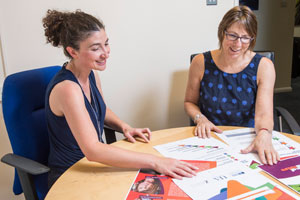
I would love JIC to be the first research institute to get a Gold award, however I want JIC to achieve this not by asking staff to do more, but to capture what they already do. I am convinced there are activities going on that I am not aware of or that the individual concerned doesn’t recognise as helping in this arena. We are very much a ‘bottom up’ institute, staff are very motivated and do a lot of this type of activity organically rather than been asked to do it by senior management.
We have made a start thinking about gold and there is one fantastic initiative that we ran earlier this year that had brilliant feedback and is likely to have huge future impact that I would like to share with you. Samantha Fox, mentioned earlier, initiated and led on this.
We organised a Women of the Future conference that brought together over 240 14-15 year old girls from 20 state schools across Norfolk and Suffolk, many with catchments in areas of high social deprivation and in remote rural or coastal locations, with female professionals in STEMM careers to share knowledge and experiences.
Now it all “sort of fits”
The conference illustrated the diversity of career options available to those with science qualifications and aimed to inspire the next generation of female STEMM professionals. We need to target this age group to get more women into science. The feedback from the conference has been very positive an example of which is shown below:
“The feedback on the journey back from the conference was extremely positive and in fact I also received a phone call from a parent of one of the students who attended saying that she had never seen her so enthused after a school trip. She also felt that it had given her an insight into why we study what we do at GCSE and how it now all “sort of fits”. I hope that there will be something similar in the future as this was such a positive experience for our girls.” – Teacher
The event attracted funding from a variety of sources including Intel, who also provided an all-female film crew that captured the views of a particular group of girls from Flegg High School before, during and after the event. We also had help from the local University, UEA and ResNet, a support group on the Norwich Research Park.
Intel has just released a YouTube video that captures the impact of this conference on some of the girls who took part:
The video will be used to influence governments around the world to encourage them to commit more money and resources into promoting gender equality in STEMM. To further increase the impact of the Women of the Future event we invited all the participating schools to take part in a new pilot project, the Youth STEMM Award, which was inspired by the popular Duke of Edinburgh award, but will be focused on STEMM.
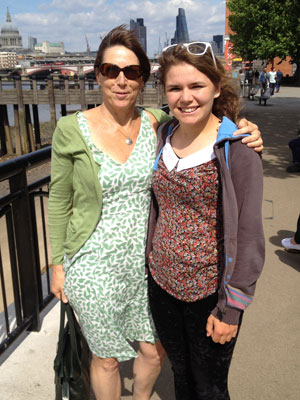
This year all the participants are female, if the project is successful we plan to go National next year and include a balanced gender participation. Exciting times.
I’d like to finish with one more quote if I may, this one is from my daughter, Holly: “I have told lots of my friends about your ‘women in science’ work, they all think it’s awesome! I have always found you very inspirational and I feel very proud of the work you are doing.” That on its own makes it all worthwhile.
https://twitter.com/JohnInnesCentre
https://www.facebook.com/JohnInnesCentre
https://www.linkedin.com/company/john-innes-centre

